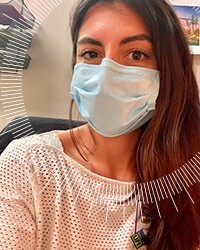Tina Caporaso was just a few months into a new job before the COVID-19 pandemic caused upheaval across the country. Hired as a living donor education coordinator at Tampa General Hospital in Florida, and currently enrolled in Kent State’s online MPH program, Caporaso found herself stepping into a new role to help her patients.
“I value communication as a human being in general, but I never really realized how important it is in times of crisis,” she said.
Caporaso is just one of many Kent Public Health students who were taking classes online when their careers pushed them to the frontlines of the COVID-19 pandemic.
Before the COVID crisis, her work at the Tampa hospital involved educating kidney recipients about organ transplants. Her responsibilities included teaching about living donation, the process for being a living donor and outreach strategies on finding one. Starting in a new role for her hospital, Caporaso was also in the middle of launching a new donation champion program, which teaches family members or friends of patients ways to identify potential living donors for their loved ones. Through the program, Caporaso teaches them outreach and communication techniques for a stronger search process.
“The role itself was brand new to everybody,” Caporaso said. “All of my jobs have been, ‘Here is what we want you to do. Can you try and do it?’ Okay, let me bring out my schoolwork. How did I do a program plan? How do I do an evaluation?”
MEETING NEW NEEDS
As the entire country faced the impact of COVID-19 this spring, with the issuance of stay-at-home orders and closing of businesses and schools, Caporaso’s hospital made drastic adjustments to daily operations. Caporaso’s responsibilities have shifted from teaching classes to taking on a critical role to keep her patients and others informed and healthy.
In addition to conducting thermometer checks as people entered her unit’s building, Caporaso helped kidney patients get online with the hospital’s new telehealth system. For many, the move was not as simple as asking them to download an app and create a new account.
“I would be on the phone with them for a good hour just trying to walk them through that and get them set up for telehealth,” said Caporaso, who found that many older patients didn’t often use their smartphones or many of its features.
“Just being empathetic and knowing this is completely new to them and they’re scared also. We’re changing all of this on them, because they’re usually in a routine of: I come into the clinic, I get my labs drawn, I see the doctor. They’re in that routine and then all of a sudden, we’re telling them to stop, stay home and use their phone.”
Now months into the pandemic, the telehealth process has become a more normal part of the routine, and patients are slowly being allowed back into the hospital. However, cases of COVID-19 are rising in Florida, so like many frontline workers, Caporaso is uncertain what will happen next.
“We have patients call every single day and say we don’t know if we want to come in, and that’s completely okay, we want them to feel comfortable and safe. They know they’re vulnerable, we know they’re vulnerable,” Caporaso said.
“It’s just been very crazy and very new, but everyday you just have to prepare yourself to go into work and see what they throw at you.”
THE STEPS AHEAD
For Caporaso and others in public health, seeing her field mentioned in today’s headlines is a strange experience.
“In this pandemic, I feel that my classes and my background in public health have given me a different perspective,” she said. “I know that the evidence and everything is going to change. It’s all day-by-day, and data isn’t accurate as soon as you read it. It can take a couple of months for data to be accurate.”
Caporaso decided to pursue the Health Policy and Management specialization in Kent State’s online MPH program because she feels like policy is one of the most impactful tools in changing public health outcomes, something she learned in her first job as a health educator for an Ohio health department.
Before and during this coronavirus pandemic, she finds herself using something she’s learned in class every day. If things get back to normal at her current role, she hopes to complete the rollout of the champions program. But until then, Caporaso is sharing her knowledge about the virus with her patients including why it will take so long to develop a vaccine and the importance of prevention techniques to stop the spread.
“A lot of patients are scared. I try to communicate to them that this is evolving. We don’t really know where this virus is going to go, how it’s going to play out completely,” she said. “I try to let them know the best way to prevent this is wash your hands, stay six feet apart, do the things that we know we can do.”
PREPARING FOR WHAT’S AHEAD
Balancing a full-time career with the coursework of a graduate public health program can be a challenge even without a global public health crisis. Taking courses online allows students the flexibility to do coursework when it’s convenient for them. For Caporaso, that means completing her weekly modules on the weekends when she has more energy and time to study.
Learn more about the online experience at Kent State and the essential skills and experience public health students like Caporaso gain in the Health Policy and Management specialization.

